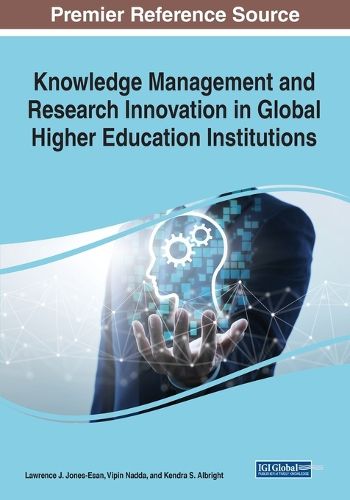Readings Newsletter
Become a Readings Member to make your shopping experience even easier.
Sign in or sign up for free!
You’re not far away from qualifying for FREE standard shipping within Australia
You’ve qualified for FREE standard shipping within Australia
The cart is loading…






This title is printed to order. This book may have been self-published. If so, we cannot guarantee the quality of the content. In the main most books will have gone through the editing process however some may not. We therefore suggest that you be aware of this before ordering this book. If in doubt check either the author or publisher’s details as we are unable to accept any returns unless they are faulty. Please contact us if you have any questions.
Research and knowledge management are important to higher education institutions as a means of improving their operations. The rapid growth of data and technologies triggers data transformation into useful information, known as knowledge. Nowadays, people are aware of the worth of knowledge and the methods used to obtain, recognize, capture, save, and leverage it, so that knowledge can be shared without losing it. Effective knowledge management programs identify and leverage the know-how embedded in work with a focus on how it will be applied. The challenge in knowledge management is to make the right knowledge available to the right people at the right time.
Knowledge Management and Research Innovation in Global Higher Education Institutions investigates the cultural, financial, and social factors affecting research and knowledge management in higher education institutions. It considers the strategic decisions made by university administrators and the adoption of decisions made by individual staff members. The book further describes the factors found to affect the implementation and practice of knowledge management in educational institutions. Covering topics such as social development, knowledge systems, and developing economies, this premier reference source is an excellent resource for faculty, administrators, and students of higher education; librarians; sociologists; economists; government officials; researchers; and academicians.
$9.00 standard shipping within Australia
FREE standard shipping within Australia for orders over $100.00
Express & International shipping calculated at checkout
This title is printed to order. This book may have been self-published. If so, we cannot guarantee the quality of the content. In the main most books will have gone through the editing process however some may not. We therefore suggest that you be aware of this before ordering this book. If in doubt check either the author or publisher’s details as we are unable to accept any returns unless they are faulty. Please contact us if you have any questions.
Research and knowledge management are important to higher education institutions as a means of improving their operations. The rapid growth of data and technologies triggers data transformation into useful information, known as knowledge. Nowadays, people are aware of the worth of knowledge and the methods used to obtain, recognize, capture, save, and leverage it, so that knowledge can be shared without losing it. Effective knowledge management programs identify and leverage the know-how embedded in work with a focus on how it will be applied. The challenge in knowledge management is to make the right knowledge available to the right people at the right time.
Knowledge Management and Research Innovation in Global Higher Education Institutions investigates the cultural, financial, and social factors affecting research and knowledge management in higher education institutions. It considers the strategic decisions made by university administrators and the adoption of decisions made by individual staff members. The book further describes the factors found to affect the implementation and practice of knowledge management in educational institutions. Covering topics such as social development, knowledge systems, and developing economies, this premier reference source is an excellent resource for faculty, administrators, and students of higher education; librarians; sociologists; economists; government officials; researchers; and academicians.